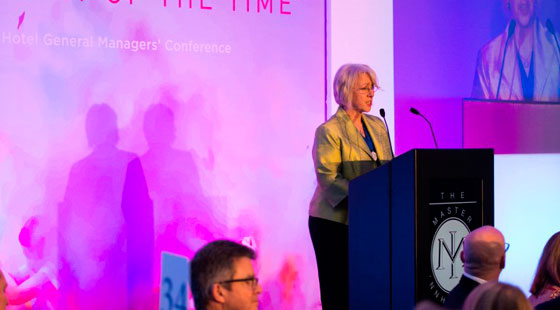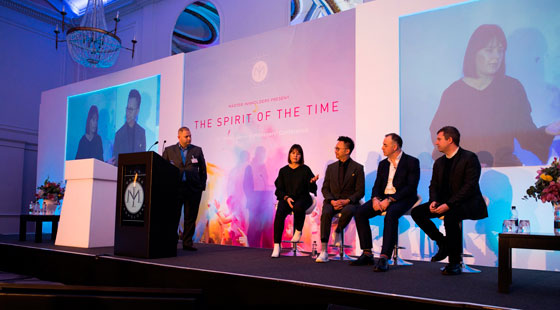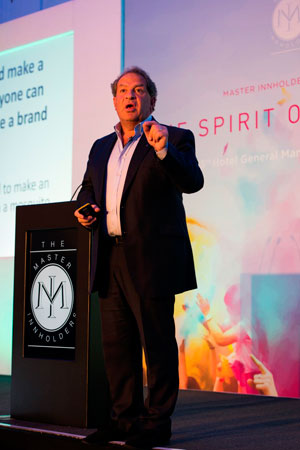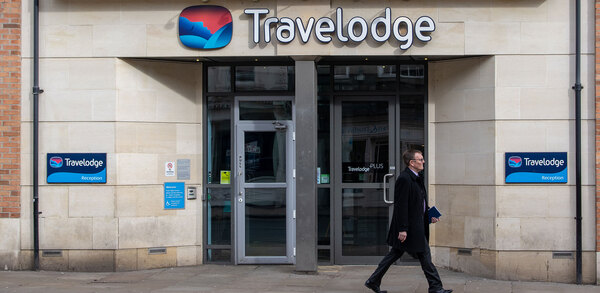Tips and trends for hoteliers in 2018
More than 400 of the UK's leading hoteliers gathered at the 25th Master Innholders Annual General Managers' Conference last week to hear how they can best prepare themselves for the next generation of customers. Janet Harmer and Katherine Price joined them at the De Vere Grand Connaught Rooms in London
Sue Williams urged hoteliers to encourage young people into hospitality
Too many hotels are failing to look after their staff, the 2017 Hotelier of the Year told attendees at the conference's gala dinner.
Sue Williams, general manager at Whatley Manor, near Malmesbury, Wiltshire, outlined her aim to become more involved with any initiatives that help inspire the next generation to take up a career in hospitality.
She urged hoteliers to spread the message that fulfilment and satisfaction in a job takes time and that the rewards can be great. "On the one hand, we have youngsters with little self-esteem and confidence, and on the other we have people who are full of self-belief, but have little substance to back it up. This leads to a challenged workforce of the future and, very sadly, I know they will struggle to find fulfilment."
She said that tech-free time needed to be introduced into the workplace to allow teams to build social skills and relationships. "This fantastic access to information needs to be balanced with emotional intelligence to bring life back into balance."
Future of hotel design
The trend for designing hotels for the ‘Instagram moment' was dismissed by leading designer Simon Rawlings.
"We don't design photos, we design interiors," said Rawlings, creative director of David Collins Studio, who sat on a panel of eminent hotel designers. "I'm designing things you cannot capture in one 2D image, including atmosphere, touch and view."
When considering future design trends, panellist Constantina Tsoutsikou, creative director at hospitality interior design consultants Hirsch Bedner Associates, highlighted "more simplified, great design in a way that is more mindful of the environment"; while group managing director of fit-out specialist Beck, Chris Galloway, said he saw a return to a more traditional feel.
Rawlings urged delegates to remember that technology must marry with people as âyou canât have hospitality without peopleâ.
Ignore the National Minimum Wage at your peril
The hospitality industry is being targeted by the taxman for not correctly paying staff the National Minimum Wage (NMW).
Jon Claypole, head of tax investigations at law firm Mazars, revealed that 62 out of the 260 businesses that were named and shamed by HM Revenue & Customs
(HMRC) in December 2017 came from the hospitality sector. âHMRC is serious, with six teams devoted to the sector,â he said.
Claypole advised that hotels need to keep clear records of work hours and annual salaries with regards to contracts, as unmeasured hours can lead to investigation. Hoteliers must note that rent and utility deductions on staff accommodation provided by the business will reduce the salary for NMW purposes. If certain clothing is required, this also needs to be deducted.
All complaints regarding NMW logged on www.gov.uk will be investigated by HMRC, with HMRC favouring the word of the employee over the employer.
Data protection challenge
One of the major challenges facing hoteliers is the introduction of new regulations regarding data protection on 25 May.
Vincent Rezzouk-Hammachi, head of data protection at Mazars, said the General Data Protection Regulation will mean changes for all companies. Businesses will need to keep detailed records of processing operations, and a data protection officer will have to be appointed for any company regarded as being at high risk. At the very least, an individual will need to be assigned to deal with data breaches and any breach will have to be reported within 72 hours.
Heavy fines will be imposed on companies that do not comply with the regulations: 4% of the organisationâs annual turnover or â¬20m (£17.8m), whichever is greater.
The future is green
Plant-based dining was the phrase on everyoneâs lips at the Evolution of Food panel, chaired by hospitality consultant and former editor of The Caterer Amanda Afiya. Robbie Bargh, founder of the Gorgeous Group, said veganism is not a trend but a culture shift, and Tredwells chef-patron Chantelle Nicholson said she preferred the term âplant-basedâ to describe the movement.
David Jarvis, store director at Selfridges, attributed its rising popularity to the innovative companies that are offering consumers more choice â" for example, the store has launched a vegan waffle bar.
âPeople are excited enough to pay for it because it isnât the norm yet, but thereâs a shift that needs to happen where people are willing to pay for it,â she said.
Other potential trends for 2018 were highlighted by Afiya: heme (a protein found in plants and meat that can be used in vegan food to mimic the taste and texture of meat); timut or timur (a Nepalese pepper with mouth-numbing qualities); hydrogen water (water into which hydrogen gas has been dissolved, said to have health benefits); and pea milk (made from yellow split peas).
Bargh added that casual dining is âgoing to take overâ and even luxury will have to be âmore relaxed luxuryâ, while Nicholson believes the hospitality industry is going to be a lot more âconsciousâ, for example with regards to waste. She cited Selfridgesâ Wasted event, where chefs were challenged to create dishes from kitchen waste, as providing the impetus for people to want to learn and do more about it.
Motivational and keynote speaker Nigel Risner injected energy into the conference with his session on how to create an effective management style. According to Risner, all staff can be described as one of four animals, and it is the role of a manager to be the zookeeper. They are:
⢠the visionary, single-minded lion
⢠the playful, extrovert monkey
⢠the careful, analytical elephant
⢠the caring, supportive dolphin.
His other key tips included:
⢠Keep your staff âin the roomâ, as 50% of staff are, in effect, not focused on their work 50% of the time and the other 50% donât want to be there.
⢠Limit meetings to a maximum of 40 minutes in the morning and 30 minutes in the afternoon.
Mindfulness
Katie Sheen, founder of Soul Nutrition, brought a sense of calm to delegates with her session on mindfulness. She urged hoteliers to âreconnect with the present moment and their inner peaceâ and to encourage their staff to do the same to prevent burnout and hopefully address the sectorâs current staff shortage.
She said: âReconnect with what is actually going on. Rather than telling your team to be inspired â" be the inspiration.â


















